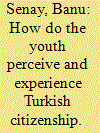| Srl | Item |
| 1 |
ID:
084077


|
|
|
|
|
| Publication |
2008.
|
| Summary/Abstract |
Citizenship is generally perceived as a political practice that falls within the historical domain of the nation-state. At least, this is the claim of many nation-states themselves, which disavow the possibility of citizenship outside of their own structures. Rather than concentrate on the organization of citizenship, this article, instead, concentrates on the experience of individual citizens. It explores a wide-ranging sample of Turkish youth's perceptions and practices of citizenship, focusing on three dimensions: citizenship as legal status; citizenship as identity; and citizenship as civic virtue. It argues that individuals' perceptions and experiences of citizenship can be mapped out according to these three dimensions, and, additionally, political affiliation or commitment is the key to young people's preference for any one of these dimensions. Thus the legal status aspect of citizenship was emphasized by liberal and republican young people; nationalist, Islamist and Kurdish youth were concerned for its identity aspects; and the civic virtue aspect was stressed by republican and leftist respondents. However the article also demonstrates that similarly to the experiences of young people themselves, these three aspects of citizenship are not clearly demarcated theoretical domains but are both deeply interrelated and conflicted with each other. The reasons for this lie in the practice and understanding of citizenship facilitated and propagated by the Turkish state.
|
|
|
|
|
|
|
|
|
|
|
|
|
|
|
|
| 2 |
ID:
190684


|
|
|
|
|
| Summary/Abstract |
In the last several years, the AKP government in Turkey has granted exceptional citizenship to more than 200,000 Syrian refugees and 19,000 foreign investors, mostly from the Middle East. This study defines the AKP’s recent policy of granting exceptional citizenship as an illiberal inclusion, which is a mode of neoliberal and particularistic inclusion without extending the eligibility and rights of regular migrants and refugees. By means of exceptional citizenship, the AKP transforms the politics of granting particularistic access to Turkish citizenship, from one characterized by an ethno-religious inclusion towards another defined by more explicit religious inclusion entangled with its neo-Ottomanist domestic and foreign policy goals. The study also suggests that the current state of granting exceptional citizenship is intermingled with the AKP’s authoritarian neoliberalism, and the structural centralization of executive power under the current presidential system.
|
|
|
|
|
|
|
|
|
|
|
|
|
|
|
|